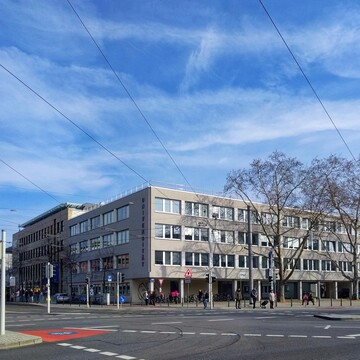Master's Program in Intercultural German Studies
Program facts and information
Degree: Master of Arts (M.A.), joint degree program
Standard period of study: 4 semesters (2 years)
ECTS credits: approx. 120
Language of instruction: German, English
Language requirements: German and English; for further information see “Admission requirements and selection”
Program start: Fall semester (September)
Academic calendarSchool: School of Humanities, University of Mannheim and Department of Germanic and Slavic Studies, University of Waterloo, Canada
Semester fee: EUR 194 (more information)
Tuition fees for international students from non-EU countries: EUR 1,500
Tuition fees for a second degree: EUR 650In accordance with the current tuition fee schedules, students have to pay additional incidential fees in the amount of approx. CAN $ 848 per term for the three terms at the University of Waterloo (status march 2024). Yet, you do not have to pay tuition fees at the University of Waterloo.
Program overview
The master’s program in Intercultural German Studies is a joint degree program in which students study one year at the University of Mannheim and at the University of Waterloo in Canada, respectively.
Students take courses in Germanic Linguistics and Literary Studies as well as in Cultural Studies and Intercultural Research.
The master's program includes one mandatory module in Mannheim and in Waterloo, respectively. Apart from that, students can flexibly organize their studies. They can chose their courses freely, focusing either on Literary Studies or Linguistics. Please see the exemplary degree plan (PDF, 16 kB) for orientation.
The master’s program in Intercultural Studies offers students the opportunity to study at two outstanding universities in two different languages and cultural areas. This enables our students not only to acquire sound specialist knowledge but also intercultural understanding that is important for their subject matter and, of course, beyond.
Why study Intercultural German Studies at the University of Mannheim?
The program was the first joint degree master’s program between two schools of humanities in Germany and Canada. This means that, at the end of their studies, students receive a degree certificate issued jointly by both universities.
The innovative study concept, the close exchange between coordinators and students, and the individual supervision are particularly noteworthy.
Career opportunities
Our graduates stand out due to their intercultural competence and enhanced mobility. These skills are becoming increasingly important in our society and thus qualify our students for jobs with international focus.
For example, they can work in public relations, marketing, project management, and consulting. Likewise, they qualify for activities in the media such as journalism, editing or proofreading.
Another option is to continue your academic education at a university in Germany or abroad. Suitable subject matters would be related fields such as second language acquisition, intercultural communication, educational science or international business administration. Successful graduates of the master's program also have the opportunity to subsequently obtain a doctoral degree and thus pursue a career in academia.
Required interests and skills
Students of the master’s program in Intercultural German Studies should
- have a pronounced interest in cultural, literary and/
or linguistic topics, - have intercultural competence and be willing to extend it,
- have a high level of motivation and willingness to work independently and in a targeted manner.
- have a pronounced interest in cultural, literary and/
Program structure
Module catalog
For students who apply for the course at the University of Mannheim, the module catalog of the University of Mannheim (only available in German) offers an overview of courses and learning content.Studying abroad
Studying abroad is mandatory during the second and third semesters. Depending on whether you have enrolled in Mannheim or Canada, you will spend both semesters at the respective partner university. It is not possible to complete the entire program of study in Mannheim.Internships
The program includes a mandatory internship in research or teaching, which should be completed during your stay in Canada if possible. Within the framework of the cooperation, corresponding internship offers are available. It is also possible to do a voluntary internship. The program manager will be happy to advise you.Continuing Education
Certificate programs
Strengthen your potential, deepen your knowledge, find solutions for challenges we will face tomorrow – there are many good reasons to think outside the box, get to know and try out new things even during your studies.At the University of Mannheim, you can do this in the “Studium Oecologicum” which focuses on sustainability. In our certificate program, you will acquire interdisciplinary expert knowledge which can help you to act ethically and to make holistic decisions.
Language courses
Making language learning easier: No matter if you want to learn Japanese, Hebrew, Spanish or Norwegian, take the Graduate Record Examination Test (GRE), The European Language Certificates (telc) or the TOEFL test – each semester, the University of Mannheim offers language courses and language certificates in more than 16 languages for students and non-university members, online and on campus!Studium Generale
Are you interested in IT or communication trainings or theater, music, or drawing courses? Studium Generale has a vast range of courses available to all.Doctorates
Successful graduates of the master’s program in Intercultural German Studies can pursue a doctorate at the School of Humanities.
A special option is the Cotutelle Program that is also run jointly with the University of Waterloo. This program involves research at both universities and culminates in a double doctorate from both universities.
The program managers will be happy to advise you on further options.
Doctoral programs and opportunities at the School of Humanities
General information on doctoral studies at the University of MannheimAdmission requirements and selection
In our selection process, we take numerous criteria into account. For more details, please check the selection statutes (see below). Be bold! Please do not hesitate to contact us if you need advice. We are looking forward to receiving your application!
Admission requirements
If you have not yet completed your bachelor’s degree, you may still apply for a master’s program as long as will provide a proof that you have obtained at least 140 ECTS credits.
- Completion of a bachelor’s program in German Studies or a related program recognized as equivalent, completed with a grade of “good” or better (equivalent to the German grade of 2.5) at a German higher education institution or abroad (also Berufsakademie) and corresponding to at least 180 ECTS credits or a standard period of study of at least three years
- Proven proficiency in English (Level B2) (may be submitted by 15 August)
- Proof of proficiency in German
Selection criteria
- The final grade or – for students still completing their degree – the grade average of the bachelor’s program
- Interview
- Letter of motivation in English (500-word maximum):
- Motivation for pursuing a master’s program in German Studies
- Reasons for choosing a binational master's program offered by the universities in Mannheim and Waterloo
- Areas you want to focus on during your master’s program
- Professional aims
- Relevance of the completed bachelor’s program
- Relevant professional activities (vocational training, work experience, internships)
- Relevant stays abroad lasting several months
- Scientific discourses and publications
- Relevant awards
Selection statutes
Under “Admission requirements and selection” we have compiled the most important selection criteria of the program for you. For more detailed explanations of the selection process and the legally binding requirements of the degree program, please refer to the selection statutes.Application
Scholarships and funding
The university offers various funding opportunities. Around 200 Mannheim students receive scholarships every year, which are intended to give them the freedom to focus on their academic achievements or to continue their voluntary work alongside their studies. Find out more about the funding opportunities and feel free to apply, for example, for the Deutschland Scholarship, the Opportunity Mannheim Scholarship or the Elite Sports Scholarship Rhine-Neckar Metropolitan Region.Funding opportunities for international degree-seeking students
Application deadline
The application deadline for fall semesters starts on 1 April and ends on 31 May.It is not possible to apply for the spring semester.
Contact
Sonja Schmalenberger
School of Humanities
Department of German Studies
L 10, 11–12 – Room 107
68161 Mannheim
on appointment

Admissions Office
L 1, 1 – Room 157, 158
68161 Mannheim
